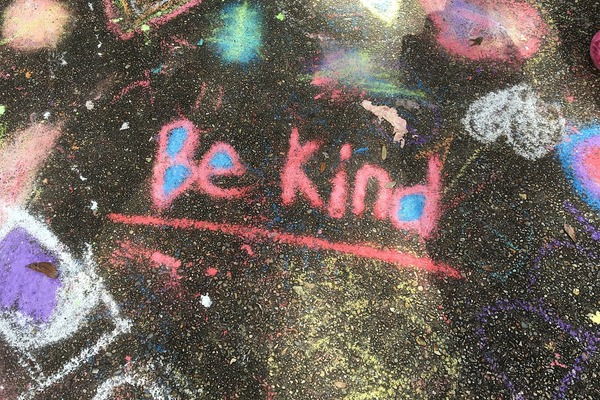The world needs a little kindness right now, and since the outbreak of the coronavirus, we have seen an increase in acts of kindness, from people going shopping for elderly neighbours to raising money for NHS charities.
But what is kindness, what motivates us to be kind, and why is it linked to wellbeing and healthier functioning at work and in life?
The definition of kindness
If you look at any definition of kindness, you will find common descriptions like doing favours or good deeds for others, helping them, taking care of them, and other acts of selfless service.
The theory of kindness
You might think kindness is just something you do, and being kind is just something you are, but there has been considerable research on the subject which has further explained the ‘theory’ about kindness, what it is, and what it is not.
The thinking about kindness says that it is;
- about being altruistic and selfless, not helping others because you will feel better or get something out of it.
- about seeing other people as being of equal worth to yourself.
- not about supporting family (which is known as kin-altruism).
- not tit-for-tat/reciprocal altruism(I’ve done this for you, now you should do this for me).
- possibly significant sacrifice for strangers and even enemies.
- considered the foundation of an ethical life.
‘Motives’ for kindness
Why are we kind? There are many possible reasons, one of which is that we like to be seen as kind because it’s a positive trait and it’s socially desirable. Many people who volunteer in various capacities are kind, but from my 30 years of experience in the voluntary sector, I have learned that people can have very mixed motives for wanting to volunteer, from wanting to increase their opportunities to socialise, to volunteering to gain power or a ‘leg up’ in some way. Even kindness is not black and white.
Are there genetic factors that make people more altruistic?
Apart from our motives to be kind, what other factors determine how kind we are? Research has found that altruism might be in our genes. In a study published in Social Cognitive and Affective Neuroscience, German researchers extracted DNA from the saliva samples of 101 men and women, in particular, focusing on three variations of the COMT gene, a gene which influences how neurotransmitters, our chemical messengers, are activated in the brain. They are of particular interest in this type of research because, neurotransmitters like dopamine are linked to positive emotions and bonding with other people.
The study participants had to memorise a set of numbers and repeat them as correctly as they possibly could, and they were given 5 Euros for doing this. They were then given the chance to increase the amount of money they had by gambling with it.
After that, the participants were shown pictures of a little girl from Peru on a charity advert. They were then told that they could anonymously donate some or all of the 5 Euros they had received to the charity.
The research found that people with two of the variations of the COMT gene donated twice as much money to charity as the people with the other variation of the gene. This happened regardless of gender.
Previous studies on altruism have been done on twins and have found that people with similar DNA display similar tendencies towards altruism, though the German study is the first to link altruism to an identified gene.
So our shared genetic material could mean that we display similar patterns of altruism, but what about shared experiences and emotions?
The difference between sympathy and empathy
Sympathy and empathy are both forms of kindness, and the terms are often used interchangeably, when in fact, they are quite different expressions of compassion.
When you express sympathy, you are expressing concern or sorrow for someone on quite a personal level. Examples include ‘I’m so sorry for your loss’ or ‘I really hope you feel better soon.’ What sympathy doesn’t require, though, is a shared experience with someone else. This is what makes it different from empathy.
Empathy is being able to see someone’s problems, pain, or suffering from their point of view and to share their emotions and experience.
But both sympathy and empathy are ways of acknowledging someone is in pain, and that we feel for them as fellow human beings.
Kindness, moral reasoning, and social responsibility
Hopefully, by reading this blog you’ve realised that there is a lot more to kindness than meets the eye.
Truly kind people want to help people because they believe in their inherent worth as human beings who are deserving of kindness and affirmation. They also have three distinct personality traits; empathy/sympathy, moral reasoning, and social responsibility. This means that they are generous with their time, money, and abilities because they know it will help someone in need. They are there for people, they listen to, empathise with, and support them. They are truly concerned for the welfare of others and they enjoy doing good deeds and taking care of people; they don’t do it out of duty or principle. They do these things because it’s the right thing to do.
Kindness and its many applications
I mentioned at the beginning of this blog that kindness was the key to better wellbeing and a healthier way of functioning at work and in life. This is because kindness is linked to positive emotions and ways of being, which can make the way we work, live, and interact with others much more fulfilling.
Here are just some of the things that are positively linked to kindness.
Gratitude
One thing that the current coronavirus crisis has taught us is to be grateful, even for the small things, because actually, they are the big things. The beauty of nature, talking to our friends and family, or that first sip of coffee in the morning. In normal circumstances, most of us rush around at 100mph and we forget to stop and be thankful for everything that makes our lives worth living. But now many of us have been forced to slow down, we’ve found a new appreciation for people and things, and that makes us more likely to be kind.
Teamworking
One of the places where it can be difficult to be kind all of the time, is the workplace, even though it’s probably one of the places where it’s needed most. Think about the people you work with regularly. You have no idea what they are going through or what invisible battle they might be fighting. An act of kindness, no matter how small, can make the biggest difference to someone.
Aside from that, kindness boosts morale, the sense of being a team, and makes being busy and up against it a little bit more bearable for everyone. It also creates a culture of kindness; one act of kindness nearly always leads to others.
Kindness is always a good idea, but when things return to some kind of normal after the current situation ends, it will be needed more than ever.
Leadership
Many people think that being a great leader is about being tough, but actually, research has shown that leaders who display warmth and kindness are more likely to inspire trust. Not only that, kind leaders who show appreciation for employees, support them, offer them feedback, and care for them as human beings are rewarded with better performing, more engaged, and loyal employees.
Fairness
Fairness is about treating other people with respect and kindness, and being able to understand what it’s like to be in their shoes. Fairness and kindness are closely linked and they share a lot of common characteristics, namely:
The desire to do good and make the world a better place.
Developing, nurturing, and valuing the relationships we have with others.
Experiencing a sense of wellbeing from helping other people/making them happy.
Love
Many of us have our own ideas of love, based on our experiences, beliefs, and conditioning, but true love is (and should be) an appreciation of the world and everyone in it, and the fact that we are all one. That may sound overly idealistic to you, but love should not be reserved for people we feel have earned it or who we think deserve it, it should be extended to everything and everyone, even those we aren’t too fond of. This is loving-kindness; the giving of love and compassion to the world and everyone and everything in it.
Kindness is about humanity
When discussing kindness as a character strength, it sits within the virtue of humanity. Humanity is about caring for others, putting them before ourselves, and doing what we can to make the world a better place.
Kindness is needed now more than ever. Imagine what the world would be like if kindness and humanity motivated all of our actions.
by Q&B member and Annual Quakers and Business 2022 conference speaker, Maureen O'Callaghan.
Maureen O’ Callaghan has a University Diploma in Mentoring and holds a Level 7 qualification in Management Studies. She also has over 30 years’ experience in leadership and management, including running her own business.
If you’re a business owner who wants to follow a more mindful and stress-free entrepreneurial path, you can find Maureen’s book ‘Success Without The Stress’ here.




